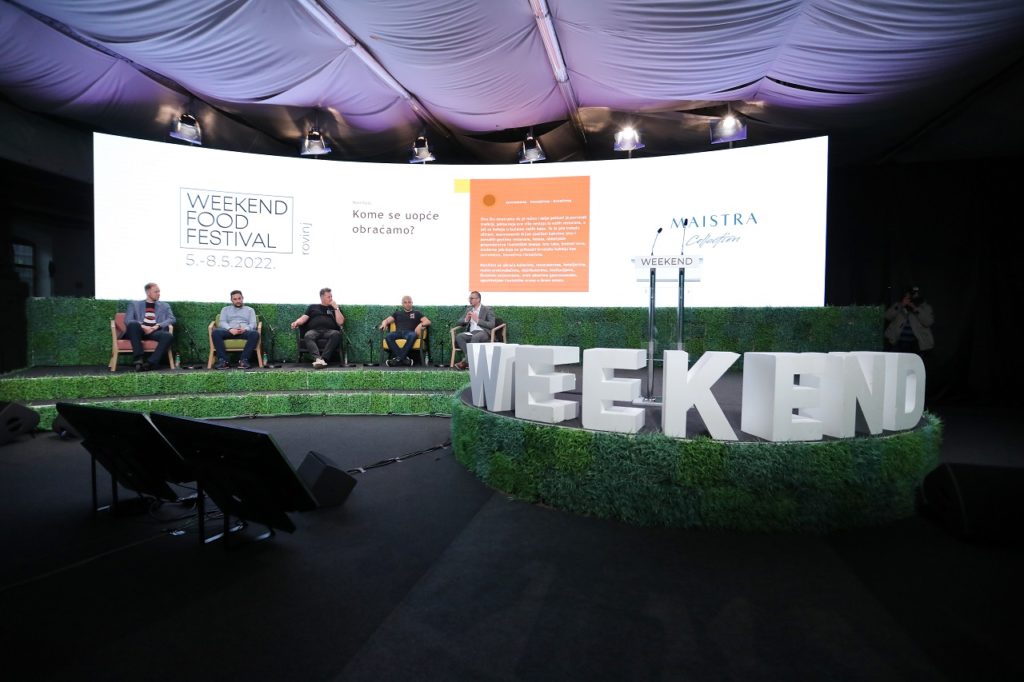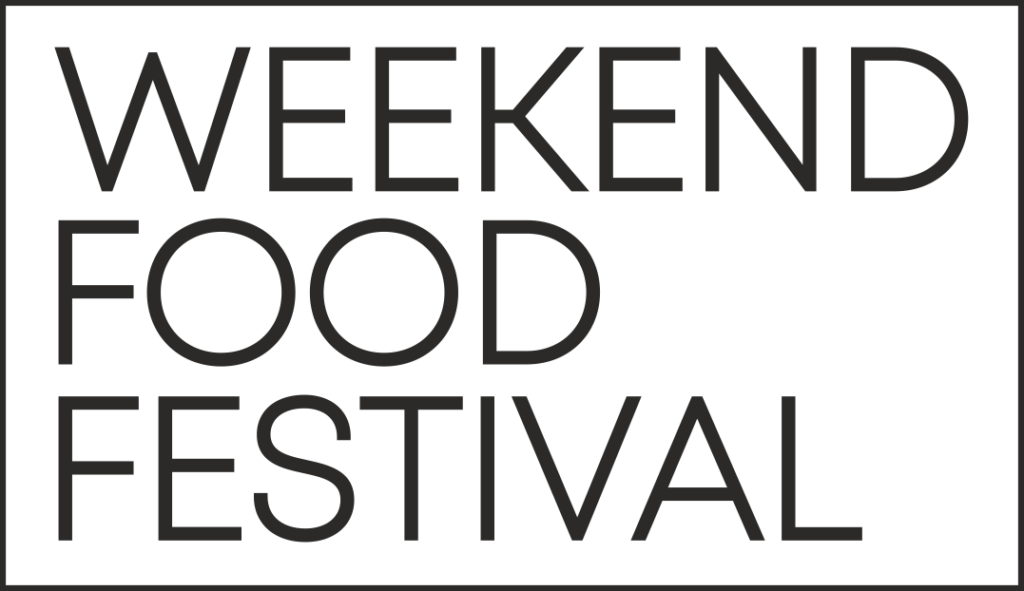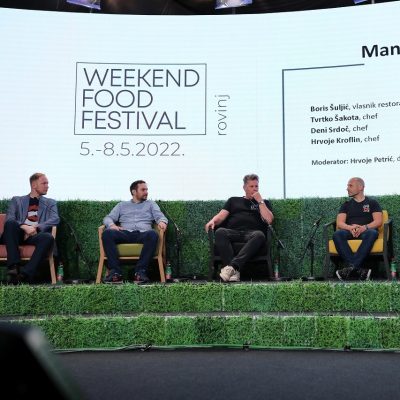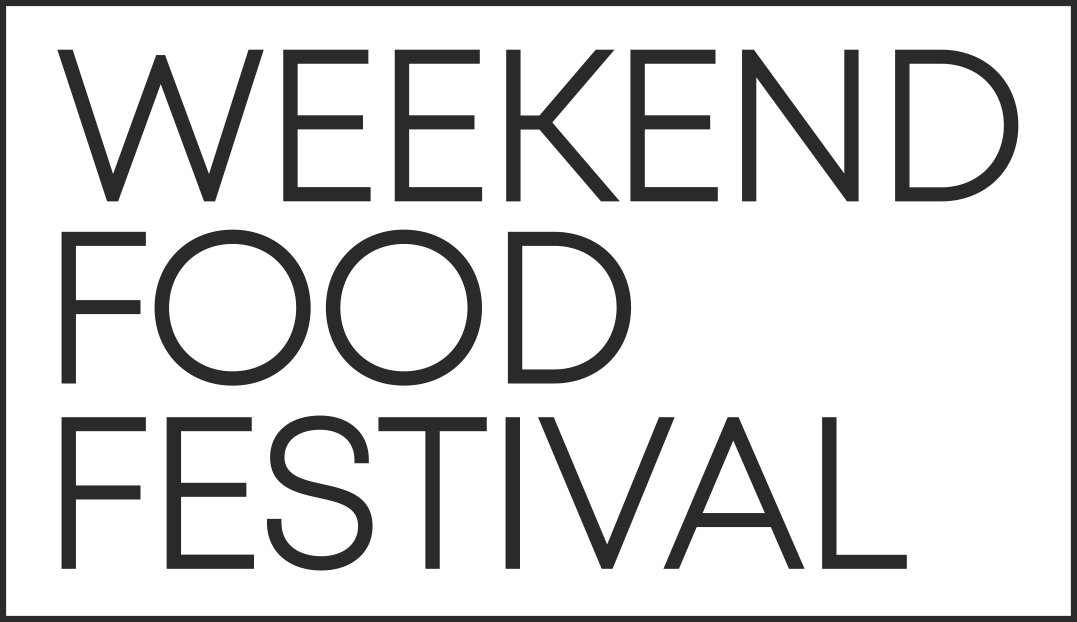If there is one thing in which Croatia is truly special, it’s the impressive spectrum of natural and cultural diversity, located in only 56,594 km². And when it comes to combining natural beauty and cultural heritage, the vast majority of people will first think of indigenous cuisine—and with good reason. The answers to the questions about what Croatia can achieve with its gastronomic riches on a global level were offered by the panel Manifesto of Croatian Cuisine, which officially opened this year’s Weekend Food Festival.

Some of the most prominent professionals on the Croatian culinary scene—chefs Hrvoje Kroflin (ManO2, Zagreb), Tvrtko Šakota (NAV, Zagreb), Deni Srdoč (Nebo Restaurant & Lounge, 1 Michelin star, Rijeka) and well-known Pag caterer Boris Šuljić (Boškinec, Novalja)—spoke about the unique initiative of the Manifesto of Croatian Cuisine, which was officially launched at this panel discussion under the moderation of the director of the Weekend Food Festival program, Hrvoje Petrić.
“The goal of this initiative, but also of the entire festival, is to show in which direction our cuisine is moving, where we are in terms of world practices and how we can present ourselves to the world in the best light possible through our indigenous gastronomy. Our intention is to send the Manifesto of Croatian Cuisine, which was compiled for the first time in history, to all relevant institutions, but also to chefs, restaurateurs, hoteliers, small producers, distributors and all other actors in the gastronomic, catering and tourism scene in order to strengthen the recognizability of Croatia through indigenous cuisine by following the examples of similarly successful practices from around the world,” said the director of the Weekend Food Festival program and the initiator of the event, Hrvoje Petrić.
One of the most important conclusions of the panel was that Croatian caterers should return to traditional cuisine and proudly present foreign visitors with original dishes that are increasingly disappearing from our restaurants. This was especially confirmed by Hrvoje Kroflin, chef of the Zagreb restaurant ManO2, who points out: “Traditional culture and recipes from continental regions that have been passed down from generation to generation are exceptionally valuable and I think we should pass them on to our younger colleagues.”
Speaking about this very topic, Boris Šuljić, the owner of the family-run hotel, restaurant and winery Boškinec, commented on the problems of the tourist season: “Tourism is something that keeps us alive, but it also kills all creativity. We look to sell as many dishes as possible that are in demand abroad, while at the same time importing labor and ingredients from abroad. Why don’t we think about how much brudet will be sold instead of hamburgers?”
In addition to the authenticity of the cuisine, the manifesto prioritizes the locality and seasonality of the food itself, as well as the sustainability of the entire process. Deni Srdoč, chef of the restaurant and lounge Nebo in Rijeka and Tvrtko Šakota, chef of the Zagreb restaurant NAV, shared their rich experiences when it comes to the importance of quality local products: “We work with 60 different suppliers, from specialized sweet potato producers to experts in various herbs. We’re really trying to show what the country has to offer, and I think it offers something really wonderful. That is why we do not try to follow the line of least resistance and work with large suppliers, but rather small producers throughout the year,” said Deni Srdoč. Chef Tvrtko Šakota, meanwhile, commented on sustainability and stressed that “people still do not understand the impact of mass tourism, for example, on our seas, especially in terms of plastic waste”.
Program director Hrvoje Petrić underline the above experiences by concluding that we undoubtedly have exceptional culinary riches which are highly valued in restaurants around the world, from Singapore to the Basque Country and Copenhagen where Croatian olive oils, scampi and truffles are used. Therefore, the goal is to make our cultural and gastronomic heritage an inspiration for local chefs who are more than capable of achieving great results and elevating Croatia to the very top of world gastronomy.



